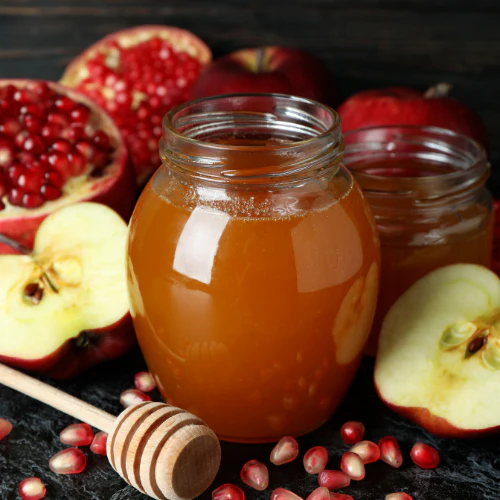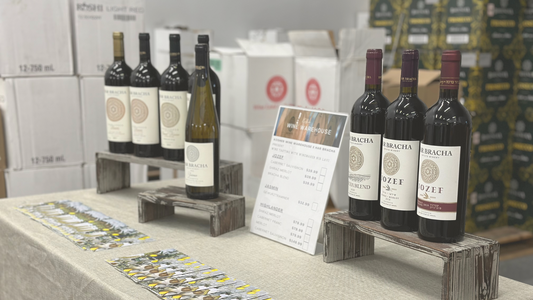
Cooking with Kosher Wines: A Culinary Journey with Adeena Sussman
In the culinary world, wine is more than just a beverage to be enjoyed with a meal. It's an essential ingredient that can elevate a dish, adding complexity, flavor, and aroma. For those who adhere to kosher dietary laws, the world of kosher wines offers a rich and diverse palette of flavors to explore.
Photo by Dan Perez, Courtesy of Adeena Sussman
Share this page:
Sitting Down with a Culinary Innovator
We enjoyed sitting with renowned cookbook author Adeena Sussman, who shared her insights, techniques, and favorite recipes, showcasing the beauty of cooking with kosher wines. Adeena's approach to cooking is sophisticated and accessible, and her passion for Israeli-influenced food shines through in her recipes.
Breaking the Rules: A Fresh Approach to Cooking with Wine
Adeena's philosophy on cooking with wine is refreshingly unconventional. While she acknowledges traditional guidelines, such as using a wine you would drink, she encourages experimentation and breaking the rules.
"I like to use white wine sometimes, even in meat stews, because it makes them a little lighter and allows other flavors to come through," Adeena explains. Conversely, she has a delightful Italian fish stew recipe that uses red wine, challenging the conventional wisdom of pairing white wine with fish.
Choosing the Right Wine: Tips and Mistakes to Avoid
When selecting a wine for cooking, Adeena emphasizes the importance of balance and choosing a wine that complements the dish's other ingredients. She warns against not cooking down the wine enough, as it's essential to remove the alcohol while retaining the delicious flavors.
Her advice is practical and down-to-earth: "I use whatever I have in the house. I don't buy wines specifically for cooking." She often reaches for acidic white wines like Gruners and Chablis or reds like Pinots and Cabernet Sauvignon.
Wine-Infused Recipes: A Celebration of Flavor
Adeena's culinary creations testify to her creativity and love for kosher wines. Her Medjool Date & Root Vegetable Meat Stew calls for white wine, specifically Sauvignon Blanc, allowing the meat's and dates' flavors to shine without overpowering them.
Her Italian fish stew, Cacciucco alla Livornese, is another standout recipe. The red wine in the broth contrasts beautifully with the delicacy of the fish, creating a hearty and flavorful dish that's sure to impress.
Pairing Wine with Food: An Art and a Science
Adeena's approach to pairing wine with food is influenced by her Israeli roots. "What grows together goes together," she says, emphasizing the harmony between Israeli wines and ingredients. Her food is user-friendly, and she believes that wines should be the same – accessible, value-oriented, and food-friendly.
Adeena suggests Spanish wines like Capçanes Peraj Petita for budget-friendly kosher wine recommendations. "It's a great value wine, very juicy and berry and cherry forward, and it goes well with meat dishes."
A Culinary Revolution: Kosher Wines Today
Adeena's enthusiasm for kosher wines is contagious. She celebrates the quality and variety revolution happening in the world of kosher wines and is excited to be part of it.
"Kosher wines have come so far, and it's exciting to share the quality revolution and the variety revolution that's going on in kosher wines right now," she says.

Adeena's New Cookbook: A Must-Have for Kosher Culinary Explorers
Excitingly, Adeena's new cookbook,SHABBAT: Recipes and Rituals From My Table to Yours, is set to be released soon. It promises to be a treasure trove of innovative recipes, expert guidance, and inspiration for those looking to explore the world of kosher wines and Israeli-influenced cooking. Keep an eye out for it, and don't miss the opportunity to add it to your culinary library!
Book Cover Courtesy of Adeena Sussman
Conclusion: Your Invitation to a Culinary Adventure
Adeena's world of cooking with kosher wines is not just about recipes and pairings; it's an invitation to a culinary adventure. It's about breaking the rules, experimenting with flavors, and finding joy in unexpected combinations. Are you ready to challenge conventional wisdom and explore new culinary horizons? Whether you're a seasoned chef or a curious food enthusiast, Adeena's insights and creativity offer a path to a richer, more flavorful dining experience. Grab a bottle of your favorite kosher wine, and let the adventure begin!

Get to Know Adeena Sussman
Adeena Sussman is the acclaimed author of "Sababa: Fresh, Sunny Flavors From My Israeli Kitchen" and is currently working on a personal take on the foods of Shabbat. She has co-authored 14 cookbooks, including three New York Times Best-sellers with Chrissy Teigen.
Having made aliyah in December 2018, Adeena now resides in Tel Aviv, where she cooks and writes. Her passion for Israeli cuisine and innovative approach to using kosher wines make her a beloved figure in the culinary world. Her upcoming cookbook promises to be another inspiring guide for those exploring kosher wines and Israeli-influenced cooking.
Adeena’s website is here, and you can follow her on Instagram at @adeenasussman.
Photo by Lisa Rich, Courtesy of Adeena Sussman
Contenido desplegable
1: How do you incorporate wine into your cooking? Are there any specific techniques or tips you can share? Are there any general guidelines you follow when cooking with wine? Such as, which types of dishes are best suited for red or white wine?
I use wine in stews and pan-seared chicken dishes. I follow the adage of using wine that I would drink, looking for bigger, bolder flavors. I don't always follow the rules; for example, I use white wine in meat stews to make them lighter and allow other flavors to come through. I also have a recipe for an Italian fish stew with red wine.
2: How do you choose a wine suitable for cooking? And does this differ from how you would choose a wine for drinking?
I use drinkable and delicious wine, not necessarily the most expensive. Open bottles of good wine in the fridge are suitable if they haven't fermented or soured. I also ask my wine vendor for advice.
3: Can you share some techniques, tips, or guidelines for cooking with different types of wine, including common mistakes to avoid?
One mistake to avoid is not cooking down the wine enough to get the alcohol out, leaving only the delicious flavors. However, sometimes I leave the wine a little less reduced if I want a boozy punch.
4: What wines are commonly used in your recipes, and which dishes?
I use whatever I have in the house, such as acidic white wines like Gruners and Chablis and reds like Pinots and Cabernet Sauvignon. I don't buy wines specifically for cooking.
5: Is there such a thing as baking with wine? Can you share a recipe and what makes it so tasty?
I don't bake with a ton of wine, but I have a recipe for stone fruit that I macerate in sparkling wine with fresh herbs like basil. I've also used wine in a soaking syrup for a cake.
6: Can you discuss how wine can enhance or change the taste and aroma of a dish?
Wines can either contrast or complement the food. I use acidic, sharper wine for heavy and rich dishes, and for similar round flavors or rich, heavy notes, I use complementary wine.
7: How do you balance wine with other ingredients to achieve the desired flavor profile?
Cooking with wine is about balance. I consider all other ingredients in the dish and choose a wine based on its structure and characteristics. It's like cooking with vanilla; you want to ensure it's the right thing for your dish.
8: What are some of your favorite wine-infused recipes that showcase the wine and dish flavors? Which wine specifically do you use in these recipes?
My medjool dates stew from Sababa calls for white wine, like Sauvignon Blanc or other slightly acidic wines. The white wine allows the flavors of the meat, dates, and other ingredients to shine without overpowering them.
9: Could you discuss your strategies for pairing wine with food and how you think food and wine complement each other?
I live in Israel and cook Israeli-influenced food, so I try to use Israeli wines. I follow the adage, "What grows together goes together." I look for elemental notes in the wine to pair with the food, but if it tastes good, it's good enough for me.
10: What advice would you give customers pairing wines with your recipes?
I recommend wines from hot climates with terroir similar to Israel, as Israeli cooking heavily influences my food. You don't necessarily need to purchase the most expensive wines; my food is user-friendly and simple but sophisticated, and similar wines would go well with it.
11: Can you recommend a budget-friendly kosher wine for a special occasion and a versatile wine that would make an excellent gift for a host? Why would you recommend it?
I've always loved Spanish wines, like Capçanes Peraj Petita. It's a terrific value wine, juicy and berry and cherry forward, and goes well with meat dishes like the spring vegetable stew from the Shabbat book or a grilled steak salad with stone fruit.
12: Can you share your philosophy on creating accessible and enjoyable recipes for home cooks and wine's role in the process?
I think of wine as the ultimate partner to great food. Accessibility and enjoyability are the main criteria for my recipes. Winemakers need to convey why their wines are value-oriented and food-friendly. The same is valid for wine education.
13: As a cookbook author, how important is it for home cooks to understand wine and its role in cooking?
It's important, but all the information should be contained within the pages of my books. We need to provide cooks with relevant information without overcomplicating it with fancy wine speak. Stick to basic parameters to help people deepen their understanding and excite their curiosity about purchasing and cooking with wine.
14: Can you share more about the Italian fish stew, the Cacciucco alla Livornese, and how wine plays a role in the recipe?
The Cacciucco alla Livornese uses red wine in the broth, making the sauce hearty and contrasting with the delicacy of the fish. Both the wine and the fish shine well in the recipe, and omitting the wine would eliminate the contrast of flavors and the depth of the recipe.
Share this page:




